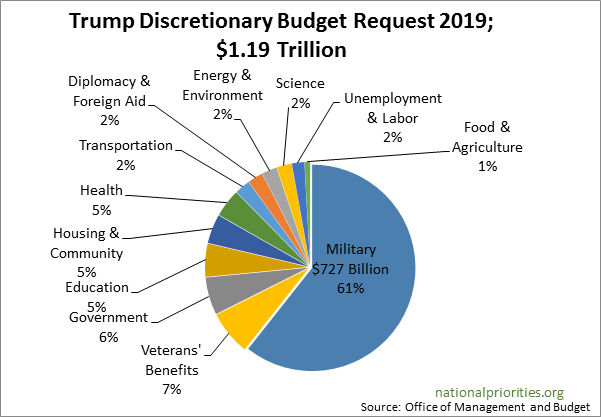Why the Bloated Military Budget Threatens to Bring Down the American Empire
TRANSCEND MEMBERS, 3 Feb 2020
David Adams | Transition to a Culture of Peace – TRANSCEND Media Service
1 Feb 2020 – The continued, unchecked, expansion of the American military budget, as described in this month’s CPNN bulletin reminds me of what happened to the Soviet empire in the 1980’s.
In the beginning of the 1980’s there were three things that foreshadowed the end of the Soviet empire:
- The decision of the CIA to destroy the Soviet empire, not by war, but by the arms race to bankrupt their economy. By matching the West’s military budgets ruble for dollar, but based on an economy only half as great, the Soviet Union was forced to divert almost all of its resources to the military. For example, in the West about 40% of scientists and engineers were engaged directly or indirectly with the military, but in the Soviet Union it was closer to 90%. There was nothing left for economic development or for the needs of the people.
- The prediction of Johan Galtung in 1980 that the Soviet Empire would collapse in 10 years.
- I experienced this when working in a scientific lab doing brain research in Moscow. When I couldn’t get decent electronics or a good electronics engineer, I asked a Russian colleague doing cardiovascular research how he got his good equipment. “I have friends in the military,” he replied. Yes, there were lines at the stores for meat, but the longest lines I saw were to buy gold or diamonds because people feared that the ruble would crash.
They were all correct, the CIA, Galtung and the people buying gold. Only instead of 10 years, it took 9 years before the ruble crashed and the empire crashed as a result.
As was the case in the Soviet Union, the continued expansion of the American military budget leaves little for economic development or for the needs of the American people. But most important, as was the case for the Soviet Union, it destroys confidence in the US dollar.
The American military budget is not paid from the profits of American exports. In fact the US regularly imports more than it exports and runs a deficit which for the year 2019 was more than $1 trillion dollars. As we have seen the military budget accounts for almost 75% of this.
The deficit is covered primarily by the sale of US treasury bills, notes and bonds, much of which are bought by other countries, the most important being Japan and China. As of October 2019, Japan held $1.27 trillion in US debt and China held $1.10 trillion.
Normally it is assumed that Japan, China and other countries will continue to buy American debt because they will lose their investment if the dollar crashes. Traditionally the dollar has been considered a “safe haven” for investments.
But there are signs that this is changing. In particular it can be seen in the movement of gold from West to East. Since 2005, Russia, China, Turkey and India have bought about 80% of the world’s gold production (36,000 tons) , and recently Japan has been buying gold as well. They pay for the gold in dollars and, at least in the case of Russia, it is stated that it is a process of “de-dollarization.” This was made explicit in remarks by the Russian Minister of Foreign Affairs this January 15.
During this time the US, in contrast has been selling its gold. It still claims to have 8,000 tons, but there are suspicions that this is exaggerated.
According to The Economist on January 18, the more that the US imposes financial sanctions on other countries (a favorite tactic of the Trump administration), the more countries will follow the suit of Russia and de-dollarize their economies.
According to The Economist article, in the past when there was economic turmoil countries bought dollars as a “safe haven”. But during the most recent crisis between the US and Iran, there were signs that this has changed. The Financial Times revealed on January 10 that this time there was no increased buying of the dollar.
Here are some quotes from the Financial Times:
“A more profound change to the dollar’s safe-haven status may be taking place, however, according to Zach Pandl, head of global foreign exchange strategy at Goldman Sachs. He pointed to efforts from Russia, which is expanding the use of euros and roubles for settling energy transactions, in an attempt to reduce its reliance on the US currency. . . . Mr Pandl said other countries could follow suit if geopolitical tensions persist. ‘If the tensions last just a few weeks or months, it will not be enough to get a large scale de-dollarisation effort under way,’ he said. ‘But if it were to last a longer period or to broaden in some way, it could affect aspects of the dollar’s global role.’”
Once the ruble crashed after 1989, it was all down-hill. Eventually, aided by CIA advisors sent to “advise” President Yeltsin, the ruble was devalued by 10,000 times. Imagine what will happen to the American empire and the global economy if the dollar loses its global role and has to be devalued!
*****************
UPDATE 8 Feb 2020: An earlier version stated that the bankruptcy of the Soviet Union because of the arms race was a deliberate policy of the CIA. It turns out that I was wrong about this. According to interviews with CIA agents who were responsible for Russian policy in the 1980’s, they did not dare to make this prediction because the US government and military-industrial-congressional complex needed to justify their own military budget by considering the Soviet Union to be a powerful enemy.
For more details on why the Soviet Union went bankrupt, see my own article written in 1991.
Please excuse me for any inconvenience this may have caused. Peace through struggle and patience,
David
_________________________________________________
 Dr. David Adams is a member of the TRANSCEND Network for Peace Development Environment and coordinator of the Culture of Peace News Network. He retired in 2001 from UNESCO where he was the Director of the Unit for the UN International Year for the Culture of Peace. Previously, at Yale and Wesleyan Universities, he was a specialist on the brain mechanisms of aggressive behavior, the history of the culture of war, and the psychology of peace activists, and he helped to develop and publicize the Seville Statement on Violence. Send him an email.
Dr. David Adams is a member of the TRANSCEND Network for Peace Development Environment and coordinator of the Culture of Peace News Network. He retired in 2001 from UNESCO where he was the Director of the Unit for the UN International Year for the Culture of Peace. Previously, at Yale and Wesleyan Universities, he was a specialist on the brain mechanisms of aggressive behavior, the history of the culture of war, and the psychology of peace activists, and he helped to develop and publicize the Seville Statement on Violence. Send him an email.
Go to Original – decade-culture-of-peace.org
Tags: Military Industrial Complex, Military Supremacy, US Military, USA
DISCLAIMER: The statements, views and opinions expressed in pieces republished here are solely those of the authors and do not necessarily represent those of TMS. In accordance with title 17 U.S.C. section 107, this material is distributed without profit to those who have expressed a prior interest in receiving the included information for research and educational purposes. TMS has no affiliation whatsoever with the originator of this article nor is TMS endorsed or sponsored by the originator. “GO TO ORIGINAL” links are provided as a convenience to our readers and allow for verification of authenticity. However, as originating pages are often updated by their originating host sites, the versions posted may not match the versions our readers view when clicking the “GO TO ORIGINAL” links. This site contains copyrighted material the use of which has not always been specifically authorized by the copyright owner. We are making such material available in our efforts to advance understanding of environmental, political, human rights, economic, democracy, scientific, and social justice issues, etc. We believe this constitutes a ‘fair use’ of any such copyrighted material as provided for in section 107 of the US Copyright Law. In accordance with Title 17 U.S.C. Section 107, the material on this site is distributed without profit to those who have expressed a prior interest in receiving the included information for research and educational purposes. For more information go to: http://www.law.cornell.edu/uscode/17/107.shtml. If you wish to use copyrighted material from this site for purposes of your own that go beyond ‘fair use’, you must obtain permission from the copyright owner.


[…] 2020 | David Adams | Transition to a Culture of Peace – TRANSCEND Media ServiceTitolo originale: Why the Bloated Military Budget Threatens to Bring Down the American EmpireTraduzione di Miki Lanza per il Centro Studi Sereno […]